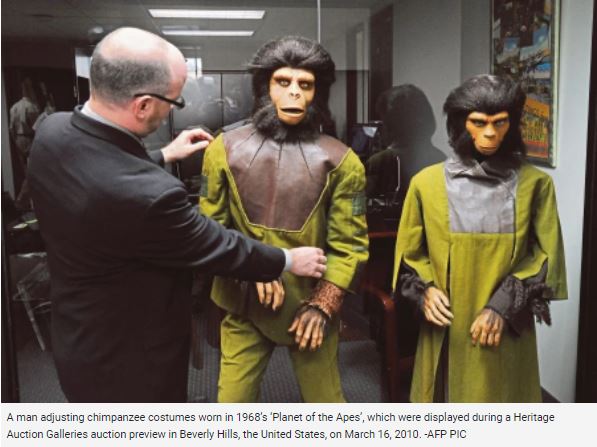What a new 'Planet of the Apes' can teach us about politics
Emeritus Professor Tan Sri Dato' Dzulkifli Abdul Razak
Opinion - New Straits Times
April 19, 2022
IN the late 1960s, Planet of the Apes was the talk of the town. It was an inspirational science-fiction movie that raised many questions about the future.
It tells a story of how apes came to rule a planet of their own at the expense of the human species when the latter, as interstellar travellers, crash-landed on the unknown planet.
As aliens, they were treated with suspicion and enslaved by the simians. Fellow travellers were killed.
More bewildering was that the apes were said to be more advanced than humankind despite the reversed evolutionary process that humans had been thought in schools.
The episode took place in the late third millennium.
That the theme resonates so well can be attributed to the sequels that lasted until 2017 with the War on the Planet of the Apes.
A television series took off in 1974, while a reboot of the original film was done as the sixth sequel in 2001.
The time frame used started in 2029.
This time, the encounter took place in the fifth millennium — two millennia away from the classic version.
For the first time, similar to humans, apes revered god in its temple of Semos, named after one of its kind.
Unfortunately, the film received bad reviews and was regarded as a disappointment.
The next installation, Rise of the Planet of the Apes, came 11 years later to glowing reviews.
A new character, Koba, of the bonobo species known to share 99 per cent of its DNA with humans, appeared for the first time.
The style of leadership observed among the bonobo (then known as pygmy chimpanzees) is said to be Machiavellian!
The alpha male is known as The Prince.
Biologist Frank de Waal even wrote a book called Chimpanzee Politics — how apt — in 1982.
A few more sequels followed, with Koba, who was abused and tormented by humans, becoming the primary antagonist.
He added more intense hatred to the series by killing more humans in revenge before he was finally eliminated by another ape in violation of "ape not kill ape" moral rule.
Still, what seems to be amiss are the intricacies as to how a more advanced humanoid species governs and controls their planet in view of the problems that humans face today.
Here is where the proposed sequel, "Parliament of the Apes", comes in.
The movie could mend the gaps humans have failed to address.
Given the current fiasco, this would be eagerly awaited to show what our "advanced" cousins have to offer in being more superior.
Perhaps, some new meanings to the monkey mantra of "see no evil, hear no evil, speak no evil, and do no evil" could be evoked, a departure from today's tendency of doing the opposite.
The movie is, therefore, not "monkey see, monkey do" that uncritically apes the past.
Instead, one could reimagine the future by taking into consideration local needs and context of the time in a dignified parliamentarian style and setting.
In particular is the role of Dr Zaius, an orangutan who is the leading member of the Ape National Assembly, and science minister.
Zaius is noted to be a defender of the species, at the expense of humans, and is dubbed an "animalistic supremacist" bent on genocide.
Simply put, the new venture would be no monkey business in attempting to shape the future amid the human struggle to survive.
The writer, an NST columnist for more than 20 years, is International Islamic University Malaysia rector

